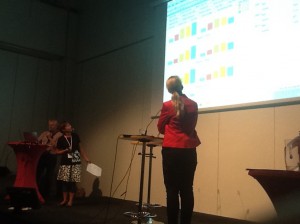The ailing woman lives longer
Statistically, we women live longer than men. Yet if we look at the number of people on sick leave, women are sick more often. So how come the ailing woman lives longer?
Region Skåne has studied the health of women and men in the county, and presented the results at a seminar during the Nordiskt Forum. The provocative question “Why does the ailing woman live longer?” was not answered in the seminar, but the issue was raised. In the study, men reported better health… yet have a shorter life expectancy.
“We used to wear out our bodies, but now we wear out our brains.”
When people in Skåne were asked to rate their own physical health, the men’s and women’s results were quite similar, but when they were asked to rate their mental health, the results were very different; many more women reported pyschiatric ill-health than men. We see an increase in psychiatric ill-health in young men aged 18-34, in women aged 35-44 and, in particular, women aged 45-54..
Gender differences in health can be seen already in children of school age. When boys and girls of school age in Skåne were asked to rate their health, boys of all ages, from age 6 upwards, reported better health than girls. When they were asked if they ever experienced any psychiatric or somatic problems, by the time they reached upper secondary school age, more than twice as many girls as boys answered ‘yes’. Girls also feel more stress caused by school work.
What affects health?
Life conditions, lifestyle factors and biological factors affect health. The first two include gender roles, differences in life conditions, a gender-segregated labour market, and health-related lifestyle habits such as smoking and alcohol consumption. Biological factors can include the influence of the sex hormones (testosterone och oestrogen) and genetic differences.
The Region Skåne study also shows that it is more common for women to experience stress in their work environment than men. Women commute mainly by bicycle and bus, while men mainly commute by car. And up until retirement age, it is mainly women who experience economic stress.
Women also feel less safe when walking in their residential area compared with men; however, we do see an improvement in this for women of all ages. It should be pointed out here that, here, we are talking about perceived safety because, in statistical terms, it is more dangerous for women to be in their homes than outdoors.
These are factors that affect health, and that we can influence – both as individuals and as a society. Greater equality in society generates better health for women. How long would we then live?
Did you know?
Statistically, men have abnormally high mortality caused by alcohol and road accidents, particularly when they are over 40.
Men take more risks than women when it comes to consumption of cigarettes, snus and alcohol.
Smoking is decreasing rapidly, both in women and men.
Women use more medicines than men – in all categories.
Women are more likely to contract cancer than men.
Men feel they have less emotional support than women.

